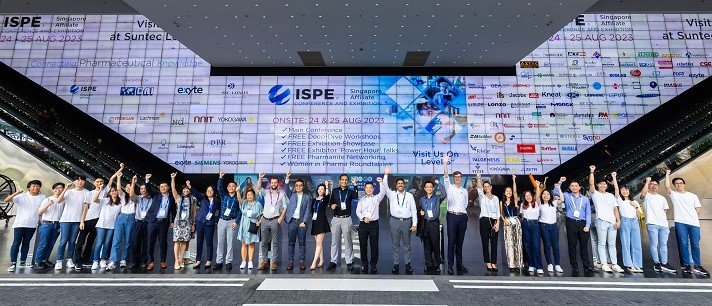
The 23 rd edition of ISPE Singapore Affiliate's Conference and Exhibition 2023 was held on 24-25 August at Suntec Singapore. The 3 day event kicked off with the online pre-Conference Symposium on 23 August and was followed by onsite Main Conference and attracted over 1,800 attendees
The conference, 'Connecting Pharmaceutical Knowledge', was streamed live and available for registered conference attendees on-demand until February 2024.
Under the theme of “Shaping the Future of Pharmaceutical Manufacturing: Trends, Technologies and Beyond” the conference featured over 90 distinguished speakers including 11 Keynotes. Spanning global to regional biologics, vaccines and pharmaceutical manufacturers, CDMOs, regulatory authorities and industry leaders. Some of the key highlights included:
Symposium Highlights
Following welcome remarks by Alfonsus Karli, Director, GCMC Vaccines, Pfizer & Vice President, ISPE Singapore, Thomas B Hartman, President & CEO, ISPE, USA shared ISPE International’s Strategic Plan. Noting the growth of the pharmaceutical industry worldwide and workforce development needed, he elaborated on ISPE’s strategic themes and key implementation initiatives to support this growth.
Industry Keynote Speakers from Pfizer, Amgen, Merck
With 3 industry and 2 regulatory keynote speakers, the morning was power-packed! Rich Pelt, Senior Director, Vaccines CMC Regulatory Affairs, Pfizer, USA, addressed the Development of mRNA Vaccines at Lightspeed: A Regulatory Perspective. Key ideas include the development and acceleration of production of COVID-19 vaccines, global authorization including regulatory innovation and flexibilities, experience with rapid updates, and opportunities to provide benefits to patients earlier and more efficiently.
To expedite vaccines approval during pandemic, Pfizer used the “lightspeed” designation within its organization. This was achieved in various ways, such as via streamlined justification for resource and capital requests, risk-based decisions with bias towards higher probability of success, decisions to use additional resources at the edge of normal vaccine network, and many product and process development activities performed in parallel instead of sequentially.
Gerard Dempsey, Executive Director, Head of Asia Pacific Regional Supply Chain, Amgen, Japan spoke on how to Delight Your Customers with Supply Chain (SC) Transformation. He expanded on the leadership dilemma and our fundamental assumptions – knowing who our customers are, and how to relate to our customers. Only then could we go back to basics via three pillars, the foundations (product flow, information flow, data integrity), the cornerstones (standardizing processes, systems and ensuring well-trained people are organized in high performing teams) and the implementation of scorecard(s). By understanding what “good” looks like and focusing on the value chain to differentiate for our customers, we can be ready for the future.
Rounding out the industry keynotes, Diane L Hustead, Executive Director, Regulatory Affairs, Merck & Co, Inc, & Drug Shortage Initiative Team Chair, ISPE, USA illustrated the ISPE Drug Shortages Prevention Model. This initiative explores opportunities within ISPE’s areas of expertise (i.e. technical, quality and regulatory) for prevention of drug shortage, aiming to advance progress in drug shortage prevention through industry guidance and health authority interactions. The guidance for drug shortage prevention excellence provides a global, modern resource that illustrates risk management opportunities at organizational, operational, and product-specific levels. This includes six (6) quality and manufacturing maturity priorities, four (4) technology and innovation priorities, and two (2) regulatory priorities.
Regulatory Keynotes by PIC/s & EMA
Thereafter, Jacques Morenas, Deputy Chair & Chair, Training sub-committee, PIC/s & Technical Advisor, Inspection Division, ANSM, France, presented the Pharmaceutical Inspection Co-operation Scheme (PIC/S) Update. The PIC/S strategic plan for year 2023-2027 focuses on inspection reliance, preferred forum for GxP harmonization, Centre of Excellence for training regulatory inspectorates, preparing regulatory inspectors for the future, partnership and stakeholder co-operation and PIC/s operational capacity.
The final and regulatory keynote was Andrei Spinei, Manufacturing Team Lead, Inspections Office, Quality and Safety of Medicines Dept, European Medicines Agency, Netherlands. His topic: EU Network Approach to Inspection Reliance and Manufacturing Innovation and how novel manufacturing is a strong strategic priority for the EMRN. The Quality Innovation Group (QIG) is the interface to translate innovation concerning manufacturing technologies into actual products, for the benefits of the patients. The group is consists of experts from three groups – Biologics Working Party (BWP), Quality Working Party (QWP) and the Inspection Working Group (IWG). Unlike the Innovation Task Force (ITF), the QIG focuses more on industry innovations and is a longer-term group. Priority topics for 2023 include continuous manufacturing (specific attention end-to-end drug substance /drug product), decentralized manufacturing, automation, and digitalization. Other topics include individualized therapies, 3-D printing, platform technologies, novel analytical methods and so on.
The concluding Global Panel session, Regulatory, Policy and Industry Approach to Combat Drug Shortages. Topics touched on opportunities for industry and drug shortage prevention, what industry can do to prevent shortage, and collaboration with regulators. For example, the understanding of leading indicators to drug shortages enable meaningful mitigations to be taken, so health systems can pivot to potentially alternative sources of supply. Common misperceptions about drug shortage prevention include underestimating the complexity to get out of a negative-inventory situation, opportunities available for proactive monitoring and collaboration between industry and regulators, and the common misperception between reporting of shortage versus getting inspected by regulators.
Industry Best Practices, Digital Transformation
Following the plenary, concurrent tracks highlighted Industry Best Practice and Digital Transformation.
Keynote speaker, Dr Joerg Block, GMP Compliance Engineering, Bayer AG Pharmaceuticals, Germany highlighted ‘Good Engineering Practice: Accelerating Project Delivery‘.
Valuable insights include system boundary definition criteria such as the facilitation of project design and delivery, the inclusion or exclusion of CDEs, consideration of intended use, automation and control systems, and likelihood of future modification. Considering these early on in the product cycle, translates to potential simplification of validations and a better risk-based approach to product and process approvals. Case studies thereafter ranged from Applying Good Engineering Practices for CIP Operation, HPAPI biomanufacturing, Single-use for mRNA, with discussion on ‘Applying Good Practices for the Project Life Cycle’ moderated by Pierre Winnepenninckx, CEO, No deviation Pte Ltd & CQV Lead, ISPE Singapore Affiliate.




